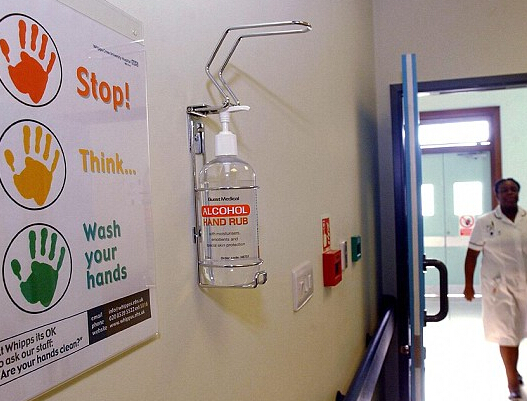一种新的耐抗生素的超级病菌的产生可以杀死一个爆发了80000名英国人,政府研究预测。在接下来的20年,手术有可能成为风险太大,因为增加感染的风险,而染上流感可能对个人的“严肃”的影响。由内阁办公室发布的数据,此前警告有效的药物将在错误面前成为耐无用,引起的疾病如肺结核和肺炎患者的数量激增。对于第一次年度国家风险的民事紧急情况登记,评估了恐怖主义,自然灾害的挑战,疾病和产业冲突,包括抗菌素耐药性危险(AMR)。

报告称:“如果没有有效的抗生素,即使是轻微的手术与常规手术可能成为高风险的程序,从而导致增加的疾病的持续时间和最终的过早死亡。
很多现代医学,例如器官移植,肠道手术和一些癌症的治疗,可能会变得不安全导致感染的风险。此外,流感大流行将变得更加严重,没有有效的治疗方法。“感染并发AMR的数量预计将增加在未来20年。如果一个广泛爆发发生,我们可以预计,大约200000人被血液细菌感染,不能用现有的药物治疗有效的影响,和大约80000的可能会死。
“高死亡的人数也会从其他形式的耐药感染。”
大约25000人死于每年在欧洲因感染耐抗生素药物。科学家们预测从增加的抗艾滋病,肺结核药物潜在的死亡,疟疾。预测的肺炎克雷伯菌耐药性,细菌性肺炎的一种形式,与金黄色葡萄球菌,皮肤感染,同时考虑。GPS可以告诉停止使用抗生素时,他们不需要为了阻止如杀死大量像他们在第二十世纪早期肺炎和肺结核疾病。
除了恐怖袭击,国家风险登记了大流行性流感的风险最高的民事紧急面对英国,可以杀死200000。风险评估确认由经济学家吉姆O'Neill是由戴维卡梅伦去年委托AMR的风险预测分析。他发现,每年有一千万人将死于2050除非新药物的开发。首席医疗官Dame Sally戴维斯也呼吁一个诊断测试,将GPS即时区分病毒和细菌感染的关系。
原文:
New breed of superbugs which are resistant to antibiotics could kill 80,000 Britons in one outbreak as scientists warn even catching flu could have 'serious' impactA new generation of superbugs resistant to antibiotics could kill up to 80,000 Britons in a single outbreak, government research predicts.
In the next 20 years, surgery could become too risky because of an increased risk of infection, while catching flu could have a ‘serious’ impact on individuals.Figures issued by the Cabinet Office warn that previously effective drugs will become useless in the face of resistant bugs, causing a surge in the number of sufferers of illnesses such as tuberculosis and pneumonia.
For the first time the annual National Risk Register of Civil Emergencies, which assesses the challenges posed by terrorism, natural disasters, disease and industrial strife, has included the dangers of antimicrobial resistance (AMR).
The report says: ‘Without effective antibiotics, even minor surgery and routine operations could become high-risk procedures, leading to increased duration of illness and ultimately premature mortality.‘Much of modern medicine, for example organ transplantation, bowel surgery and some cancer treatments, may become unsafe due to the risk of infection.‘In addition, influenza pandemics would become more serious without effective treatments.‘The number of infections complicated by AMR are expected to increase markedly over the next 20 years. If a widespread outbreak were to occur, we could expect around 200,000 people to be affected by a bacterial blood infection that could not be treated effectively with existing drugs, and around 80,000 of these might die.
‘High numbers of deaths could also be expected from other forms of antimicrobial resistant infection.’
Around 25,000 people die annually across Europe because of infections that are resistant to antibiotic drugs. Scientists have forecast the potential fatalities from an increasing resistance to drugs in HIV, tuberculosis, malaria.The predicted antibiotic resistance of klebsiella pneumonia, a form of bacterial pneumonia, and staphylococcus aureus, a skin infection, were also taken into account.
GPs could be told to stop prescribing antibiotics when they are not needed in order to stop illnesses such as pneumonia and tuberculosis from killing huge numbers like they did early in the twentieth century.Other than terrorist attacks, the National Risk Register cites pandemic influenza as the highest risk civil emergency facing Britain, which could kill 200,000.
The risk assessment confirms predictions made by economist Jim O’Neill who was commissioned by David Cameron last year to analyse the risk of AMR. He found that ten million people a year will die by 2050 unless new drugs are developed.
Chief Medical Officer Dame Sally Davies has also called for a diagnostics test that would allow GPs to instantly differentiate between viral and bacterial infections.



